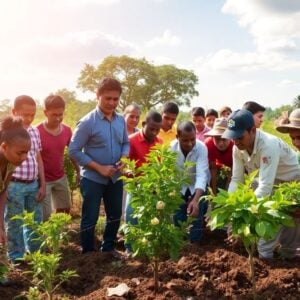Nobel laureate Abhijit Banerjee recently shared insights on tackling global poverty, emphasizing the need to challenge misconceptions about impoverished individuals and highlighting the importance of evidence-driven policies. Speaking at Harvard Chan School, Banerjee, a pioneer in development economics, discussed innovative approaches to poverty alleviation and the crucial role of research in informing effective interventions.
Key Takeaways
- Challenging Misconceptions About the Poor
- The Case for Global Wealth Redistribution
- The Importance of Persuasion in Policy Implementation
- Acknowledging Progress While Addressing Setbacks
Understanding the Lives of the Impoverished
Banerjee, co-recipient of the 2019 Nobel Prize in Economics for his experimental approach to alleviating global poverty, pushed back against common judgments of those living in poverty. He stressed that impoverished individuals, like everyone else, seek joy and spend money on non-essential items such as phones for communication or televisions for entertainment. "The idea that even very poor people don’t spend their entire income on food is entirely part of the distinction between surviving and living," Banerjee stated, underscoring that poverty alleviation efforts must recognize the full spectrum of human needs and desires.
Strategies for Poverty Alleviation
Banerjee’s work, often conducted through the Abdul Latif Jameel Poverty Action Lab (J-PAL), involves rigorous field experiments to test various interventions. He mentioned a study in Kenya focused on the most effective methods for administering universal basic income. When questioned about global wealth redistribution, Banerjee unequivocally supported the idea, stating, "I think the answer is obviously yes…there’s no credible argument on the other side." He specifically called for the elimination of tax havens, which enable the ultra-wealthy to evade tax responsibilities, as a means to reduce inequality.
Bridging Research and Policy
Beyond generating evidence, Banerjee emphasized the critical need for effective communication and persuasion to translate research findings into actionable policies. He argued that researchers must engage with media members and policymakers to ensure their studies gain the necessary attention and influence. "The evidence is essential…but once you have the evidence, you still need the bandwidth to take it to the next layer," he explained.
Acknowledging Progress and Future Outlook
Despite the setbacks caused by the recent pandemic, Banerjee pointed to significant progress made in the two decades prior to 2020. He highlighted substantial reductions in extreme poverty, infant mortality, maternal mortality, and malaria deaths. "It’s easy to despair, but if you look at the period from 2000 to 2019, it’s a period that’s actually remarkably positive for the world’s poorest," he remarked, expressing hope that this positive trajectory can be regained.
Sources
- Nobel laureate discusses ways to alleviate global poverty, Harvard T.H. Chan School of Public Health.
- Global poverty solutions: Q&A with Nobel laureate Abhijit Banerjee, Harvard T.H. Chan School of Public Health.







